SME Internationalization Strategies in Nigeria
VerifiedAdded on 2019/09/20
|7
|1863
|448
Report
AI Summary
This report examines the strategies for small and medium enterprise (SME) internationalization, focusing on the challenges and barriers faced by local agricultural businesses in Nigeria. It explores the meaning of internationalization for businesses, analyzing its benefits and challenges. The report investigates effective strategies like exporting and e-commerce, highlighting the importance of factors such as organizational innovativeness, proactive approaches, and risk management. Key barriers identified include knowledge gaps, resource limitations (financial and human), technological constraints, cultural differences, and regulatory hurdles. Recommendations include adopting e-commerce technologies, investing in market research, and improving organizational readiness to navigate the complexities of international markets. The report concludes that successful internationalization is crucial for the growth of Nigerian SMEs and the national economy, emphasizing the need to address the identified challenges to unlock the full potential of these businesses in the global market.
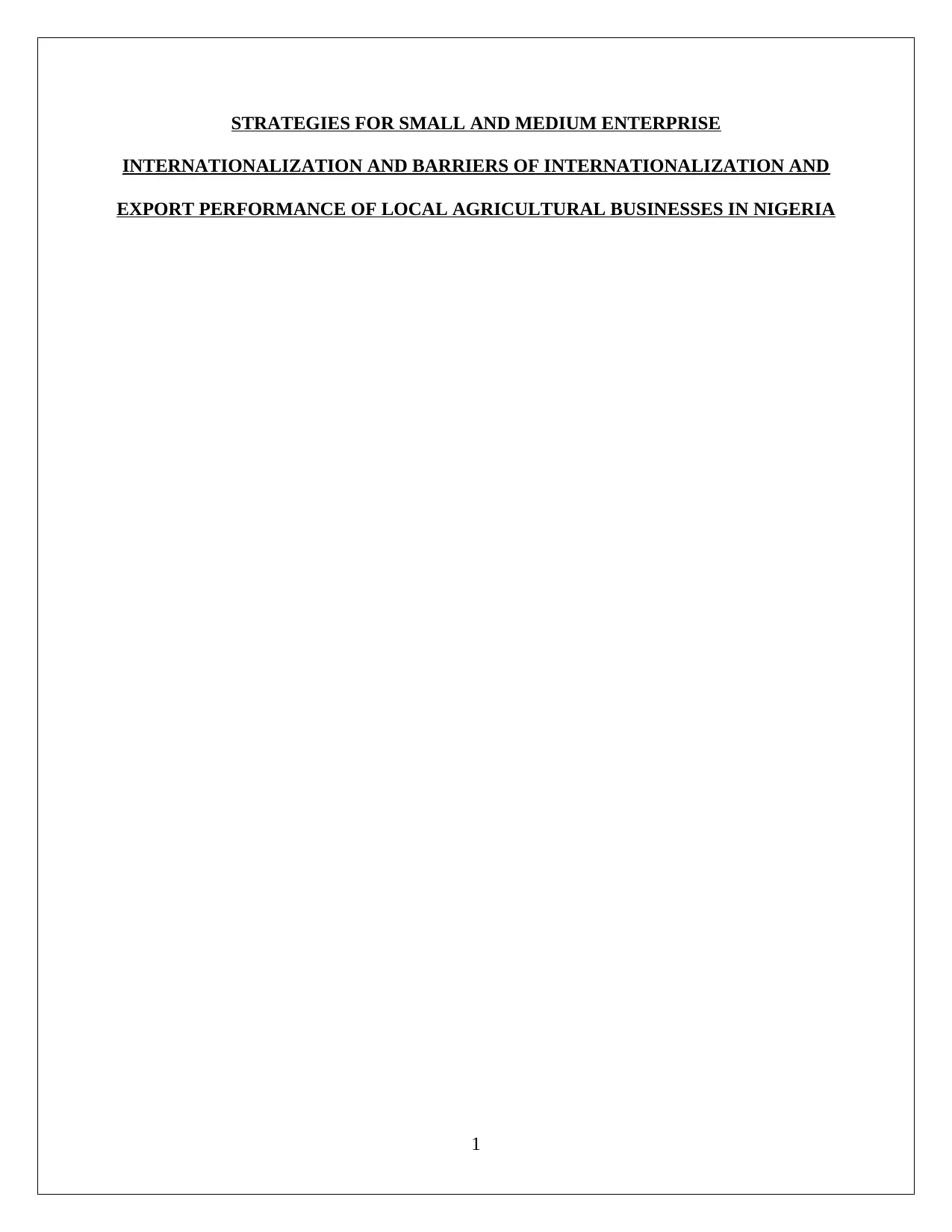
STRATEGIES FOR SMALL AND MEDIUM ENTERPRISE
INTERNATIONALIZATION AND BARRIERS OF INTERNATIONALIZATION AND
EXPORT PERFORMANCE OF LOCAL AGRICULTURAL BUSINESSES IN NIGERIA
1
INTERNATIONALIZATION AND BARRIERS OF INTERNATIONALIZATION AND
EXPORT PERFORMANCE OF LOCAL AGRICULTURAL BUSINESSES IN NIGERIA
1
Paraphrase This Document
Need a fresh take? Get an instant paraphrase of this document with our AI Paraphraser
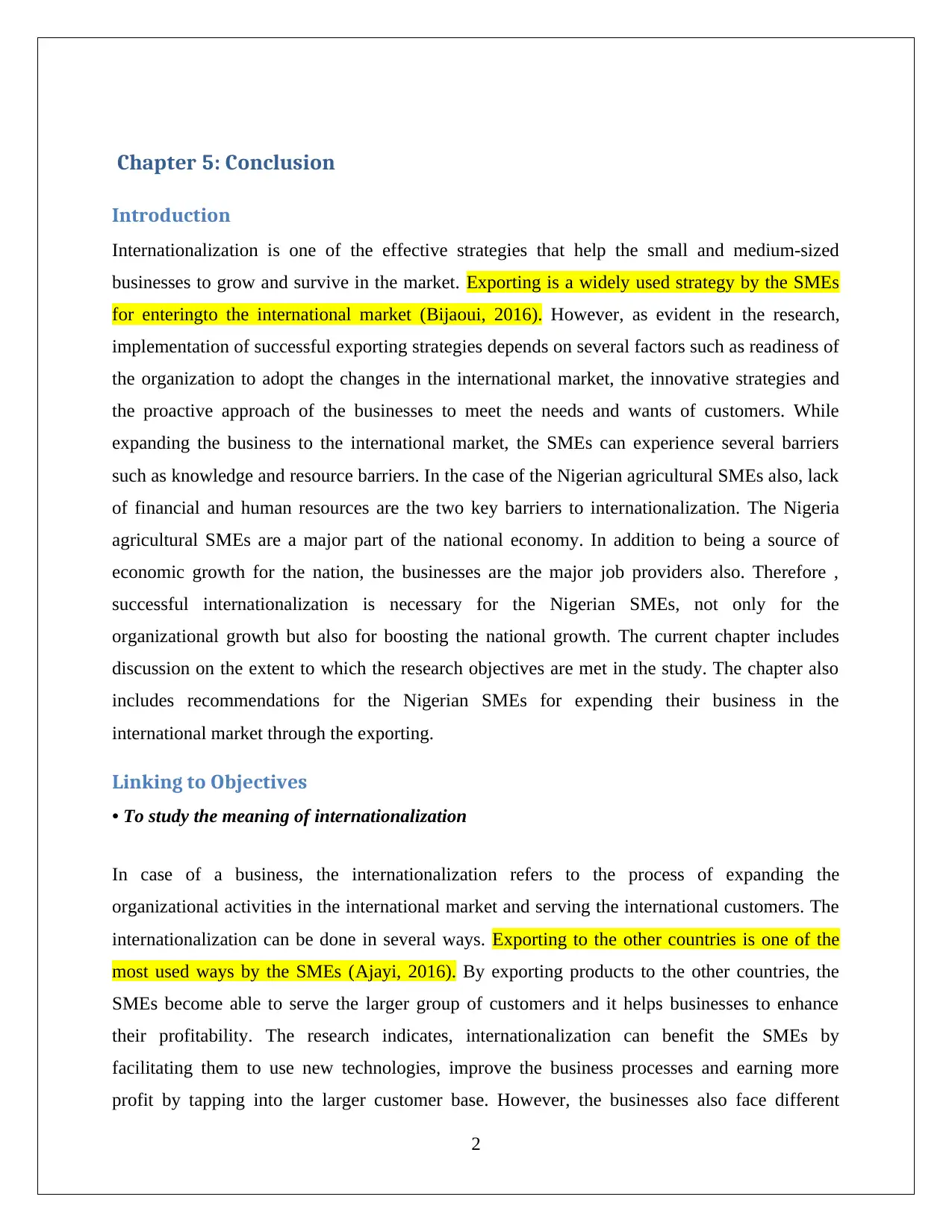
Chapter 5: Conclusion
Introduction
Internationalization is one of the effective strategies that help the small and medium-sized
businesses to grow and survive in the market. Exporting is a widely used strategy by the SMEs
for enteringto the international market (Bijaoui, 2016). However, as evident in the research,
implementation of successful exporting strategies depends on several factors such as readiness of
the organization to adopt the changes in the international market, the innovative strategies and
the proactive approach of the businesses to meet the needs and wants of customers. While
expanding the business to the international market, the SMEs can experience several barriers
such as knowledge and resource barriers. In the case of the Nigerian agricultural SMEs also, lack
of financial and human resources are the two key barriers to internationalization. The Nigeria
agricultural SMEs are a major part of the national economy. In addition to being a source of
economic growth for the nation, the businesses are the major job providers also. Therefore ,
successful internationalization is necessary for the Nigerian SMEs, not only for the
organizational growth but also for boosting the national growth. The current chapter includes
discussion on the extent to which the research objectives are met in the study. The chapter also
includes recommendations for the Nigerian SMEs for expending their business in the
international market through the exporting.
Linking to Objectives
• To study the meaning of internationalization
In case of a business, the internationalization refers to the process of expanding the
organizational activities in the international market and serving the international customers. The
internationalization can be done in several ways. Exporting to the other countries is one of the
most used ways by the SMEs (Ajayi, 2016). By exporting products to the other countries, the
SMEs become able to serve the larger group of customers and it helps businesses to enhance
their profitability. The research indicates, internationalization can benefit the SMEs by
facilitating them to use new technologies, improve the business processes and earning more
profit by tapping into the larger customer base. However, the businesses also face different
2
Introduction
Internationalization is one of the effective strategies that help the small and medium-sized
businesses to grow and survive in the market. Exporting is a widely used strategy by the SMEs
for enteringto the international market (Bijaoui, 2016). However, as evident in the research,
implementation of successful exporting strategies depends on several factors such as readiness of
the organization to adopt the changes in the international market, the innovative strategies and
the proactive approach of the businesses to meet the needs and wants of customers. While
expanding the business to the international market, the SMEs can experience several barriers
such as knowledge and resource barriers. In the case of the Nigerian agricultural SMEs also, lack
of financial and human resources are the two key barriers to internationalization. The Nigeria
agricultural SMEs are a major part of the national economy. In addition to being a source of
economic growth for the nation, the businesses are the major job providers also. Therefore ,
successful internationalization is necessary for the Nigerian SMEs, not only for the
organizational growth but also for boosting the national growth. The current chapter includes
discussion on the extent to which the research objectives are met in the study. The chapter also
includes recommendations for the Nigerian SMEs for expending their business in the
international market through the exporting.
Linking to Objectives
• To study the meaning of internationalization
In case of a business, the internationalization refers to the process of expanding the
organizational activities in the international market and serving the international customers. The
internationalization can be done in several ways. Exporting to the other countries is one of the
most used ways by the SMEs (Ajayi, 2016). By exporting products to the other countries, the
SMEs become able to serve the larger group of customers and it helps businesses to enhance
their profitability. The research indicates, internationalization can benefit the SMEs by
facilitating them to use new technologies, improve the business processes and earning more
profit by tapping into the larger customer base. However, the businesses also face different
2
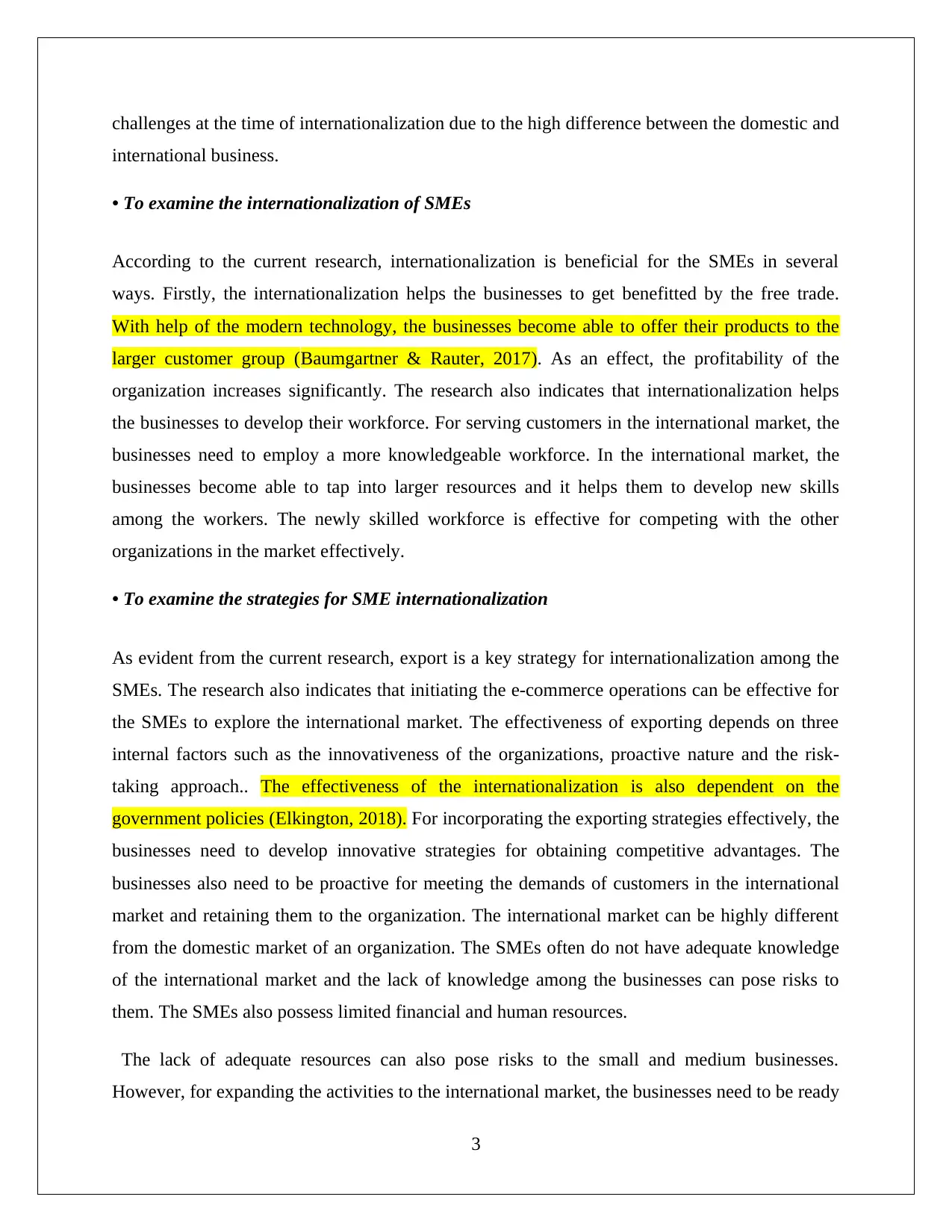
challenges at the time of internationalization due to the high difference between the domestic and
international business.
• To examine the internationalization of SMEs
According to the current research, internationalization is beneficial for the SMEs in several
ways. Firstly, the internationalization helps the businesses to get benefitted by the free trade.
With help of the modern technology, the businesses become able to offer their products to the
larger customer group (Baumgartner & Rauter, 2017). As an effect, the profitability of the
organization increases significantly. The research also indicates that internationalization helps
the businesses to develop their workforce. For serving customers in the international market, the
businesses need to employ a more knowledgeable workforce. In the international market, the
businesses become able to tap into larger resources and it helps them to develop new skills
among the workers. The newly skilled workforce is effective for competing with the other
organizations in the market effectively.
• To examine the strategies for SME internationalization
As evident from the current research, export is a key strategy for internationalization among the
SMEs. The research also indicates that initiating the e-commerce operations can be effective for
the SMEs to explore the international market. The effectiveness of exporting depends on three
internal factors such as the innovativeness of the organizations, proactive nature and the risk-
taking approach.. The effectiveness of the internationalization is also dependent on the
government policies (Elkington, 2018). For incorporating the exporting strategies effectively, the
businesses need to develop innovative strategies for obtaining competitive advantages. The
businesses also need to be proactive for meeting the demands of customers in the international
market and retaining them to the organization. The international market can be highly different
from the domestic market of an organization. The SMEs often do not have adequate knowledge
of the international market and the lack of knowledge among the businesses can pose risks to
them. The SMEs also possess limited financial and human resources.
The lack of adequate resources can also pose risks to the small and medium businesses.
However, for expanding the activities to the international market, the businesses need to be ready
3
international business.
• To examine the internationalization of SMEs
According to the current research, internationalization is beneficial for the SMEs in several
ways. Firstly, the internationalization helps the businesses to get benefitted by the free trade.
With help of the modern technology, the businesses become able to offer their products to the
larger customer group (Baumgartner & Rauter, 2017). As an effect, the profitability of the
organization increases significantly. The research also indicates that internationalization helps
the businesses to develop their workforce. For serving customers in the international market, the
businesses need to employ a more knowledgeable workforce. In the international market, the
businesses become able to tap into larger resources and it helps them to develop new skills
among the workers. The newly skilled workforce is effective for competing with the other
organizations in the market effectively.
• To examine the strategies for SME internationalization
As evident from the current research, export is a key strategy for internationalization among the
SMEs. The research also indicates that initiating the e-commerce operations can be effective for
the SMEs to explore the international market. The effectiveness of exporting depends on three
internal factors such as the innovativeness of the organizations, proactive nature and the risk-
taking approach.. The effectiveness of the internationalization is also dependent on the
government policies (Elkington, 2018). For incorporating the exporting strategies effectively, the
businesses need to develop innovative strategies for obtaining competitive advantages. The
businesses also need to be proactive for meeting the demands of customers in the international
market and retaining them to the organization. The international market can be highly different
from the domestic market of an organization. The SMEs often do not have adequate knowledge
of the international market and the lack of knowledge among the businesses can pose risks to
them. The SMEs also possess limited financial and human resources.
The lack of adequate resources can also pose risks to the small and medium businesses.
However, for expanding the activities to the international market, the businesses need to be ready
3
⊘ This is a preview!⊘
Do you want full access?
Subscribe today to unlock all pages.

Trusted by 1+ million students worldwide
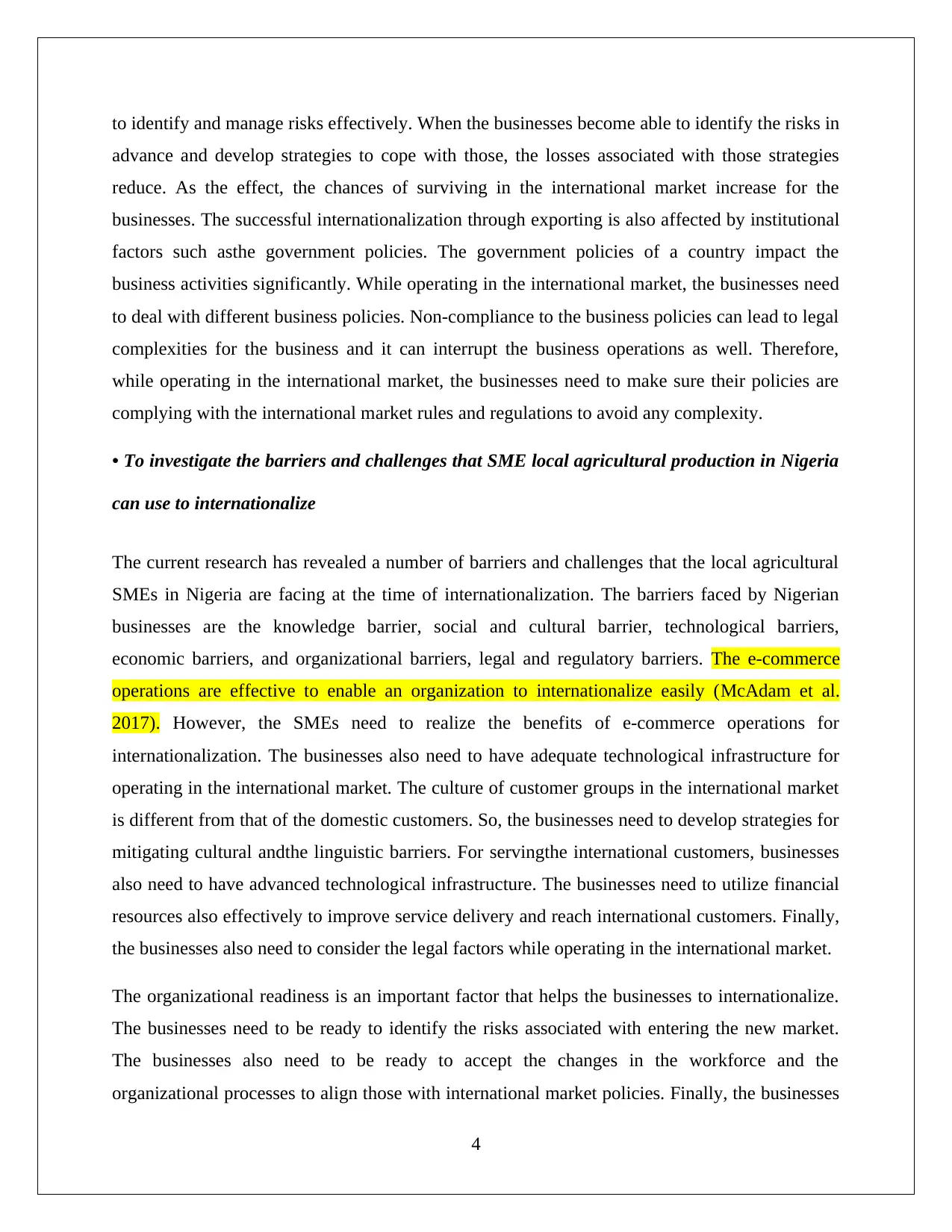
to identify and manage risks effectively. When the businesses become able to identify the risks in
advance and develop strategies to cope with those, the losses associated with those strategies
reduce. As the effect, the chances of surviving in the international market increase for the
businesses. The successful internationalization through exporting is also affected by institutional
factors such asthe government policies. The government policies of a country impact the
business activities significantly. While operating in the international market, the businesses need
to deal with different business policies. Non-compliance to the business policies can lead to legal
complexities for the business and it can interrupt the business operations as well. Therefore,
while operating in the international market, the businesses need to make sure their policies are
complying with the international market rules and regulations to avoid any complexity.
• To investigate the barriers and challenges that SME local agricultural production in Nigeria
can use to internationalize
The current research has revealed a number of barriers and challenges that the local agricultural
SMEs in Nigeria are facing at the time of internationalization. The barriers faced by Nigerian
businesses are the knowledge barrier, social and cultural barrier, technological barriers,
economic barriers, and organizational barriers, legal and regulatory barriers. The e-commerce
operations are effective to enable an organization to internationalize easily (McAdam et al.
2017). However, the SMEs need to realize the benefits of e-commerce operations for
internationalization. The businesses also need to have adequate technological infrastructure for
operating in the international market. The culture of customer groups in the international market
is different from that of the domestic customers. So, the businesses need to develop strategies for
mitigating cultural andthe linguistic barriers. For servingthe international customers, businesses
also need to have advanced technological infrastructure. The businesses need to utilize financial
resources also effectively to improve service delivery and reach international customers. Finally,
the businesses also need to consider the legal factors while operating in the international market.
The organizational readiness is an important factor that helps the businesses to internationalize.
The businesses need to be ready to identify the risks associated with entering the new market.
The businesses also need to be ready to accept the changes in the workforce and the
organizational processes to align those with international market policies. Finally, the businesses
4
advance and develop strategies to cope with those, the losses associated with those strategies
reduce. As the effect, the chances of surviving in the international market increase for the
businesses. The successful internationalization through exporting is also affected by institutional
factors such asthe government policies. The government policies of a country impact the
business activities significantly. While operating in the international market, the businesses need
to deal with different business policies. Non-compliance to the business policies can lead to legal
complexities for the business and it can interrupt the business operations as well. Therefore,
while operating in the international market, the businesses need to make sure their policies are
complying with the international market rules and regulations to avoid any complexity.
• To investigate the barriers and challenges that SME local agricultural production in Nigeria
can use to internationalize
The current research has revealed a number of barriers and challenges that the local agricultural
SMEs in Nigeria are facing at the time of internationalization. The barriers faced by Nigerian
businesses are the knowledge barrier, social and cultural barrier, technological barriers,
economic barriers, and organizational barriers, legal and regulatory barriers. The e-commerce
operations are effective to enable an organization to internationalize easily (McAdam et al.
2017). However, the SMEs need to realize the benefits of e-commerce operations for
internationalization. The businesses also need to have adequate technological infrastructure for
operating in the international market. The culture of customer groups in the international market
is different from that of the domestic customers. So, the businesses need to develop strategies for
mitigating cultural andthe linguistic barriers. For servingthe international customers, businesses
also need to have advanced technological infrastructure. The businesses need to utilize financial
resources also effectively to improve service delivery and reach international customers. Finally,
the businesses also need to consider the legal factors while operating in the international market.
The organizational readiness is an important factor that helps the businesses to internationalize.
The businesses need to be ready to identify the risks associated with entering the new market.
The businesses also need to be ready to accept the changes in the workforce and the
organizational processes to align those with international market policies. Finally, the businesses
4
Paraphrase This Document
Need a fresh take? Get an instant paraphrase of this document with our AI Paraphraser
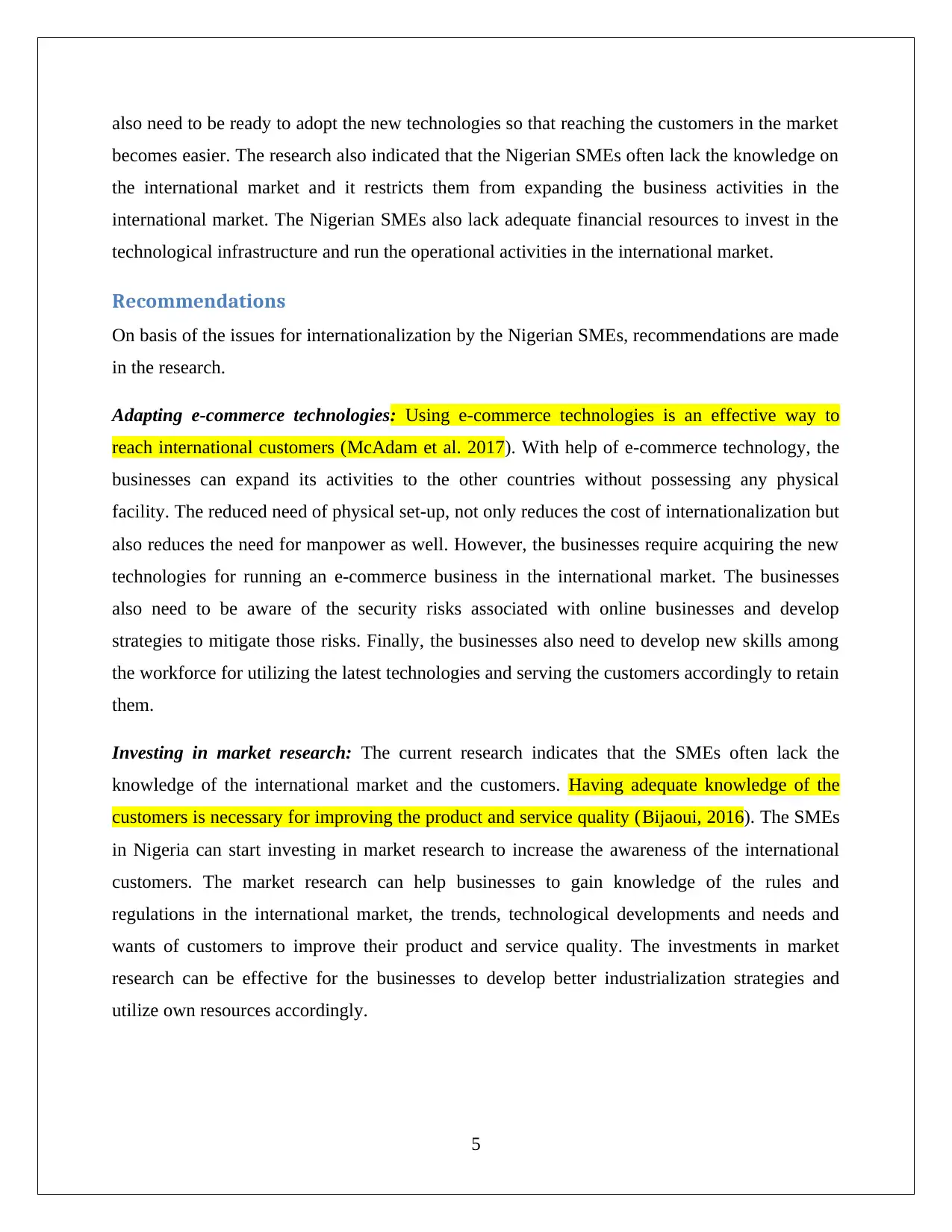
also need to be ready to adopt the new technologies so that reaching the customers in the market
becomes easier. The research also indicated that the Nigerian SMEs often lack the knowledge on
the international market and it restricts them from expanding the business activities in the
international market. The Nigerian SMEs also lack adequate financial resources to invest in the
technological infrastructure and run the operational activities in the international market.
Recommendations
On basis of the issues for internationalization by the Nigerian SMEs, recommendations are made
in the research.
Adapting e-commerce technologies: Using e-commerce technologies is an effective way to
reach international customers (McAdam et al. 2017). With help of e-commerce technology, the
businesses can expand its activities to the other countries without possessing any physical
facility. The reduced need of physical set-up, not only reduces the cost of internationalization but
also reduces the need for manpower as well. However, the businesses require acquiring the new
technologies for running an e-commerce business in the international market. The businesses
also need to be aware of the security risks associated with online businesses and develop
strategies to mitigate those risks. Finally, the businesses also need to develop new skills among
the workforce for utilizing the latest technologies and serving the customers accordingly to retain
them.
Investing in market research: The current research indicates that the SMEs often lack the
knowledge of the international market and the customers. Having adequate knowledge of the
customers is necessary for improving the product and service quality (Bijaoui, 2016). The SMEs
in Nigeria can start investing in market research to increase the awareness of the international
customers. The market research can help businesses to gain knowledge of the rules and
regulations in the international market, the trends, technological developments and needs and
wants of customers to improve their product and service quality. The investments in market
research can be effective for the businesses to develop better industrialization strategies and
utilize own resources accordingly.
5
becomes easier. The research also indicated that the Nigerian SMEs often lack the knowledge on
the international market and it restricts them from expanding the business activities in the
international market. The Nigerian SMEs also lack adequate financial resources to invest in the
technological infrastructure and run the operational activities in the international market.
Recommendations
On basis of the issues for internationalization by the Nigerian SMEs, recommendations are made
in the research.
Adapting e-commerce technologies: Using e-commerce technologies is an effective way to
reach international customers (McAdam et al. 2017). With help of e-commerce technology, the
businesses can expand its activities to the other countries without possessing any physical
facility. The reduced need of physical set-up, not only reduces the cost of internationalization but
also reduces the need for manpower as well. However, the businesses require acquiring the new
technologies for running an e-commerce business in the international market. The businesses
also need to be aware of the security risks associated with online businesses and develop
strategies to mitigate those risks. Finally, the businesses also need to develop new skills among
the workforce for utilizing the latest technologies and serving the customers accordingly to retain
them.
Investing in market research: The current research indicates that the SMEs often lack the
knowledge of the international market and the customers. Having adequate knowledge of the
customers is necessary for improving the product and service quality (Bijaoui, 2016). The SMEs
in Nigeria can start investing in market research to increase the awareness of the international
customers. The market research can help businesses to gain knowledge of the rules and
regulations in the international market, the trends, technological developments and needs and
wants of customers to improve their product and service quality. The investments in market
research can be effective for the businesses to develop better industrialization strategies and
utilize own resources accordingly.
5
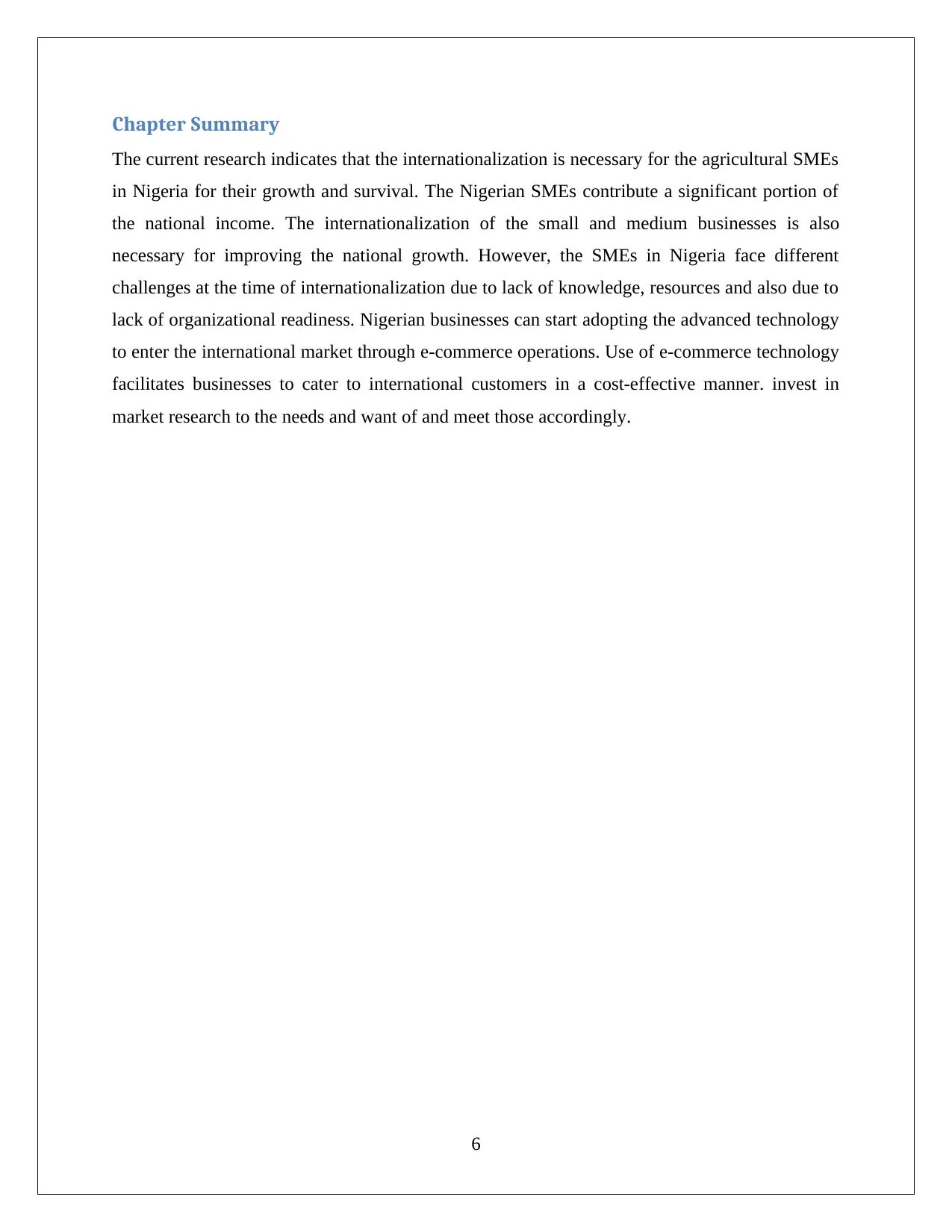
Chapter Summary
The current research indicates that the internationalization is necessary for the agricultural SMEs
in Nigeria for their growth and survival. The Nigerian SMEs contribute a significant portion of
the national income. The internationalization of the small and medium businesses is also
necessary for improving the national growth. However, the SMEs in Nigeria face different
challenges at the time of internationalization due to lack of knowledge, resources and also due to
lack of organizational readiness. Nigerian businesses can start adopting the advanced technology
to enter the international market through e-commerce operations. Use of e-commerce technology
facilitates businesses to cater to international customers in a cost-effective manner. invest in
market research to the needs and want of and meet those accordingly.
6
The current research indicates that the internationalization is necessary for the agricultural SMEs
in Nigeria for their growth and survival. The Nigerian SMEs contribute a significant portion of
the national income. The internationalization of the small and medium businesses is also
necessary for improving the national growth. However, the SMEs in Nigeria face different
challenges at the time of internationalization due to lack of knowledge, resources and also due to
lack of organizational readiness. Nigerian businesses can start adopting the advanced technology
to enter the international market through e-commerce operations. Use of e-commerce technology
facilitates businesses to cater to international customers in a cost-effective manner. invest in
market research to the needs and want of and meet those accordingly.
6
⊘ This is a preview!⊘
Do you want full access?
Subscribe today to unlock all pages.

Trusted by 1+ million students worldwide
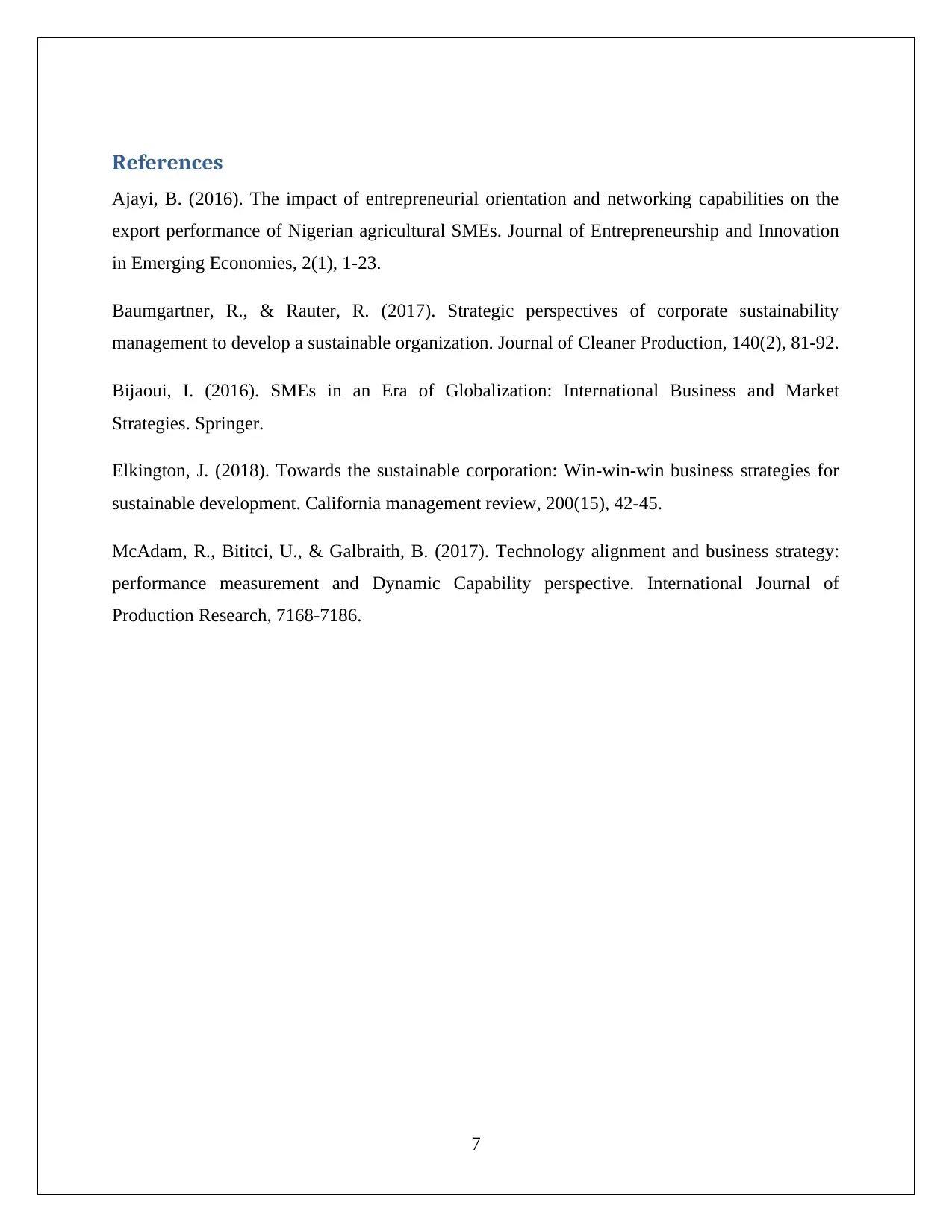
References
Ajayi, B. (2016). The impact of entrepreneurial orientation and networking capabilities on the
export performance of Nigerian agricultural SMEs. Journal of Entrepreneurship and Innovation
in Emerging Economies, 2(1), 1-23.
Baumgartner, R., & Rauter, R. (2017). Strategic perspectives of corporate sustainability
management to develop a sustainable organization. Journal of Cleaner Production, 140(2), 81-92.
Bijaoui, I. (2016). SMEs in an Era of Globalization: International Business and Market
Strategies. Springer.
Elkington, J. (2018). Towards the sustainable corporation: Win-win-win business strategies for
sustainable development. California management review, 200(15), 42-45.
McAdam, R., Bititci, U., & Galbraith, B. (2017). Technology alignment and business strategy:
performance measurement and Dynamic Capability perspective. International Journal of
Production Research, 7168-7186.
7
Ajayi, B. (2016). The impact of entrepreneurial orientation and networking capabilities on the
export performance of Nigerian agricultural SMEs. Journal of Entrepreneurship and Innovation
in Emerging Economies, 2(1), 1-23.
Baumgartner, R., & Rauter, R. (2017). Strategic perspectives of corporate sustainability
management to develop a sustainable organization. Journal of Cleaner Production, 140(2), 81-92.
Bijaoui, I. (2016). SMEs in an Era of Globalization: International Business and Market
Strategies. Springer.
Elkington, J. (2018). Towards the sustainable corporation: Win-win-win business strategies for
sustainable development. California management review, 200(15), 42-45.
McAdam, R., Bititci, U., & Galbraith, B. (2017). Technology alignment and business strategy:
performance measurement and Dynamic Capability perspective. International Journal of
Production Research, 7168-7186.
7
1 out of 7
Related Documents
Your All-in-One AI-Powered Toolkit for Academic Success.
+13062052269
info@desklib.com
Available 24*7 on WhatsApp / Email
![[object Object]](/_next/static/media/star-bottom.7253800d.svg)
Unlock your academic potential
Copyright © 2020–2026 A2Z Services. All Rights Reserved. Developed and managed by ZUCOL.





